Your cart is currently empty!
Blog
-
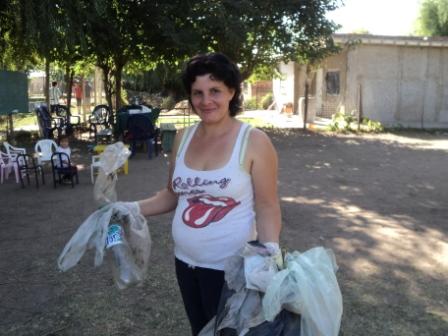
Report from ACORN Kenya
ASSOCIATION OF COMMUNITY ORGANIZATIONS FOR REFORMS NOW
Mobile Contact: 0722416343
P.O. Box 6253-00200 Nairobi, Kenya
Email:Kenya@acornkenya.org
Website: www.acorninternational.com
A PROGRESSIVE REPORT FOR THE MONTH OF NOVEMBER, 2014
29TH NEVEMBER, 2014
Introduction
The month of November was vibrant with a number of activities on the ground being membership recruitment drive, planning committee meetings and membership meetings.
As a country, we faced a major challenge of insecurity as the Al- Shabab militia massacred 28 people in Mandera North Eastern part of the country.
In Korogocho and the neighboring estates same issue of insecurity was witnessed in form of mugging and other petty crimes. These cases normally increase as we approach the festive seasons of December every year.
Campaigns.
The organizing committee is planning for big celebration for people living with HIV/AIDs on 9 December 2014. We are targeting 1,000 people from Korogocho and the neighboring estates to attend. It will be a two-day event. On 8 December we will have Testing and Counseling for HIV/AIDs which will culminate into a celebration on the following day. Faulu Kenya Bank one of our stakeholders has agreed to partially sponsor the event.
The celebration for children as part of campaigns to push for guiding policies on use of drugs and child neglect has been scheduled for 19 December 2014. We are yet to confirm any organization interested in sponsor this event but it that crucial that we have to do it to reduce the issues of drug trafficking and child abuse in the area.
Membership Recruitment.
VILLAGE
RECRUITED NEW MEMBERS
Kariobangi
5
Ngomongo
3
Gitathuru
2
Grogon B
6
Grogon A
2
Total
18
Membership Meetings
VILLAGE
DATE
VENUE
ATTENDANCE
AGENDA
Kariobangi and surrounding areas
27th December,2014
at 4.00pm
ACORNS office in Kariobangi
39
-Membership recruitment drive.- Up-dates
-Dues collection
Highridge and the surrounding villages to Babandogo
28th December, 2014
at 3.00pm
Calvary church
47
-membership recruitment drive.- Other up-dates.- -dues collection
Dues collection
VILLAGE
NO. OF MEMBERS
TOTAL IN KSHS
Kariobangi
33
700
High ridge
45
900
Other villages
23
460
TOTAL
101
2,060
Report by Sammy and David
ACORN Kenya Community Organizers
-
Report for ACORN Honduras
Report from ACORN Honduras for August 2014.
-
CGCE Volunteers at ACORN Canada
(An English message will follow)
Bonjour,
Puisque vous aviez participer à la réalisation d’une vidéo pour le Centre d’engagement mondial et communautaire, nous vous envoyons le lien vers la version finale de la vidéo:
Merci encore une fois de votre participation. Cette vidéo permettra au CEMC de partager ses succès et informer les étudiants de nos services.
****
Hello,
As you were involved in the realisation of a video for the Centre for Global and Community engagement, we are sending you the link to the final version of the video:
Thank you again for your participation. This video will allow us to share the CGCE’s success and inform students on our services.
-
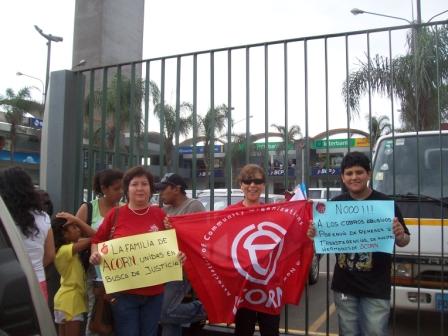
Canada’s Digital Divide Campaign Gains Lots of Press- Way to Go ACORN Canada
Protesters rally for low-income families that fall victim to the ‘digital divide’
Samantha Wright Allen More from Samantha Wright Allen
Published on: August 21, 2014Last Updated: August 21, 2014 10:00 PM EDT
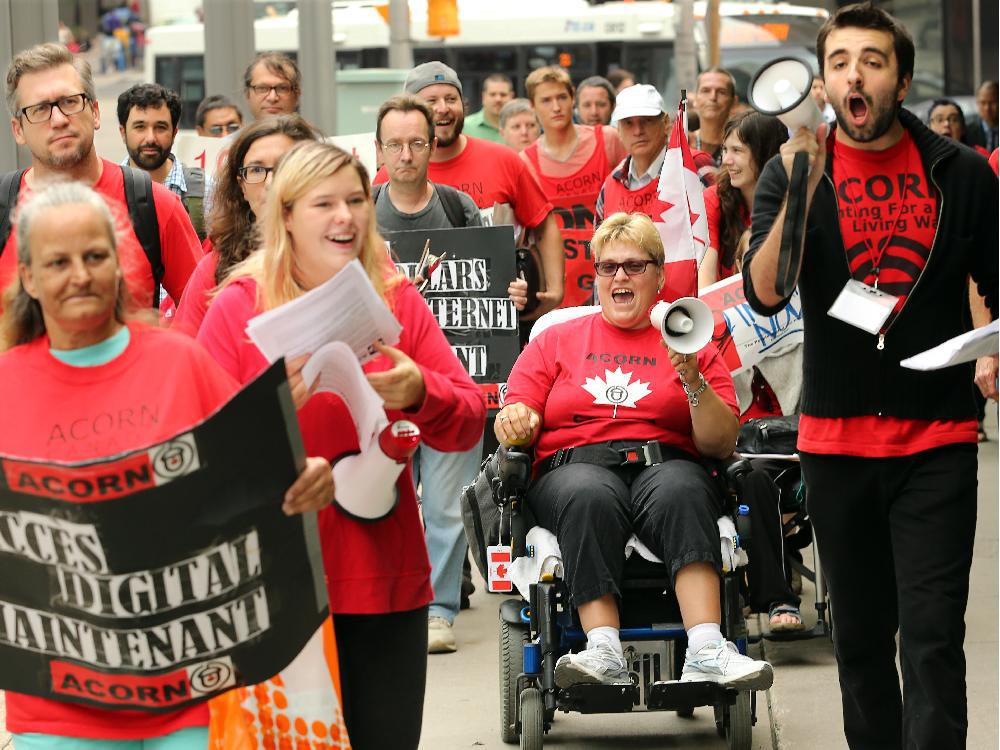
The group wants the federal government and the CRTC to lower broadband prices for low income families so kids can do homework at home.
A national advocacy organization wants the federal government to better regulate broadband to give cheaper access to Internet for low income families.
Leeann Gates — a member of ACORN, the organization that coordinated Thursday afternoon’s rally to close what they say is a “digital divide” in society — says that, for years she went without Internet service, but buckled a few years back so that her daughter, now in Grade 9, could use the web for schoolwork.
But in the summer, they go without service.
“It’s important … A lot of teachers do homework through the Internet,” said Gates at the downtown Ottawa Public Library brand where about 25 protesters formed a mock library lineup, then marched to Parliament Hill.
Gates says her daughter has a learning disability and online resources can help with comprehension.
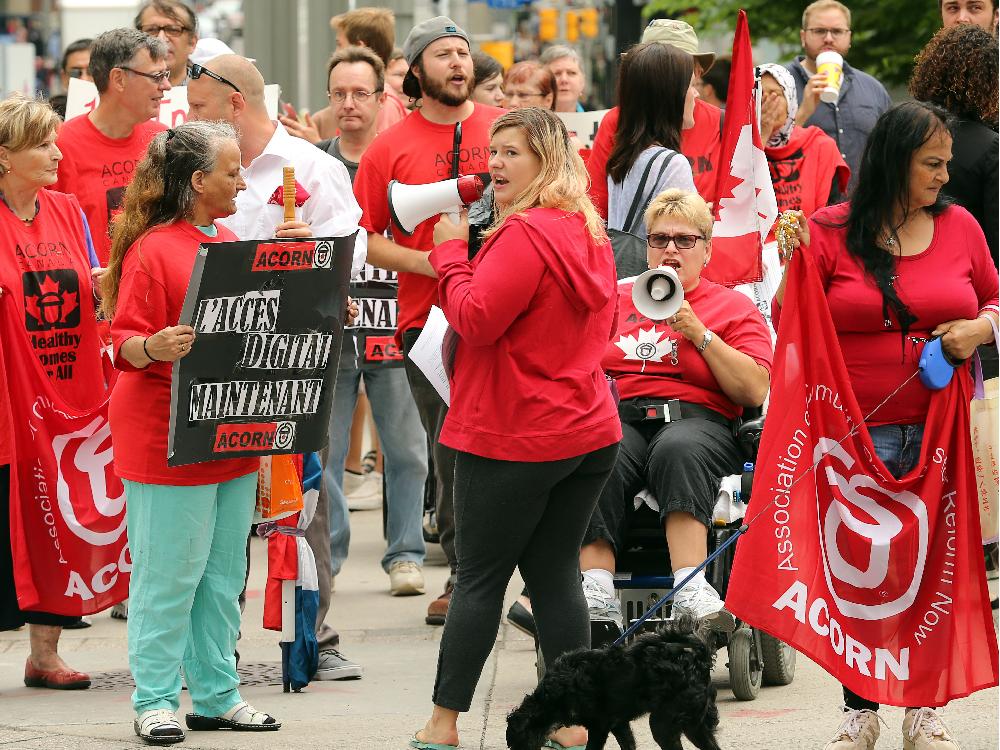
“I’m paying money that I don’t have,” said Gates, who estimates she pays about $50 a month for Internet. Lowering that would leave more for expenses like hydro or basic items for her family. “I could stop saying ‘Hey, don’t eat so much bread or milk this week.’”
The rally was part of a series of Canada-wide “back-to-school actions” by members of ACORN, the Association of Community Organizations for Reform Now. The protests demanded more affordable Internet, arguing their children shouldn’t have rely on libraries to complete homework.
According to the organization about 18 per cent of Canadians don’t have broadband, but that number jumps to nearly half for low income earners.

None of the $132 million allocated by the CRTC in 2012 to ensure Canadians connect to a “world-class communications system” specifically helped poor Canadians access home broadband, the organization contents.
Robert Fitzpatrick said Internet access is a necessity.
“As someone who’s on disability for being vision impaired as well as a permanent resident working to become a citizen, I need to stay connected (with immigration websites) so I can keep on top of my paperwork,” said Fitzpatrick, 26, who has been in Canada for just over two years and is 95-per-cent blind.
He pays about $75 a month with a roommate, and says a lower rate would mean “extra food or more clothing.”
Kathleen Fortin, who is in a wheelchair, echoed those sentiments.
The Ottawa resident said that web access is important for communication, health reasons, but also for practical purposes like job applications.
“It becomes a society of have and have-nots.”
Published on Sun Aug 17 2014
A lot of time, study, and money has been spent making sure lower-income kids receive a good education.
But a new barrier threatens to divide the haves from the have-nots at school — and later on in their careers.
It’s a lack of access to home computers and affordable, fast connections to the Internet. In 2012, almost 98 per cent of the top income households were connected to the Internet, compared to only 58 per cent of those earning less than $30,000.
A home computer and Internet connection may sound like a luxury, but study after study shows it’s a necessity to help kids from lower-income families keep up at school.
Pew Research, a leading U.S. think-tank, found that 56 per cent of teachers face a “major challenge” incorporating more digital tools into their teaching, because of low-income kids’ lack of access. And 84 per cent of teachers agree digital technologies are leading to greater disparities between affluent and disadvantaged schools and school districts.
A London School of Economics study found providing home Internet access to low income households closes the gap in use, “potentially reducing disadvantage.” It also found kids who have Internet access at home spend more time online, providing them with “higher levels of online skills and self-efficacy.”
Interestingly, home computers may also keep kids out of trouble. A PCs for People study found kids who can connect to the Internet at home were 6 to 8 per cent more likely to graduate from high school than those who couldn’t. Why? Simply by giving them something constructive to do that engages their interest. It’s a source of entertainment, as well as an educational opportunity.
All of this is why ACORN Canada (the Association of Community Organizations for Reform Now), which represents low- and moderate-income families, is holding back-to-school “actions” across the country this coming week.
Plans include setting up fake Internet cafés outside Bell Canada offices in Toronto and forming a line-up from the Ottawa Public Library to Parliament Hill with three goals in mind. The first is to highlight the problem. The second is to ask the Canadian Radio-television and Telecommunications Commission to invest in breaking down the digital divide for low income kids (as they recently did for rural Canadians). The pressure broadband providers to create $10-a-month Internet connection packages for all low-income families. It’s not a pipedream.
Rogers Communications, to its credit, rolled out a $10 connection program in 2013 for 58,000 low-income families living in Toronto Community Housing.
Educators are stepping in, too. Peel District School Board, for example, partnered with computer companies to provide low-cost tablets and refurbished computers to low-income families and now is reaching out to Internet providers “to level the playing field,” says Carla Pereira, acting manager of communications.
That’s because teachers recognize libraries can’t fill the gap.
Ashley Morris, a single mum of a 7-year-old Owen and 2-year-old Charlotte, proves the point. When Owen has homework to do, she lugs both kids to the library through a “not great neighbourhood” at night. Even then, Owen may have to line up to use the computer and it doesn’t give him time for other creative activities.
Using computers is not just about doing homework, but about “a growing experience with using technology and supporting learning in other ways,” says Heather Mathis, the acting director of Toronto’s branch libraries.
ACORN’s protests should prompt Canada’s major Internet connectors — companies such as Rogers, Bell, Telus, and TekSavvy — to work out programs for low-income families to narrow the digital divide.
It’s not just an investment in young people, but one in Canada’s future economic competitiveness. Let’s get our kids connected. All of them.
Fighting for the right to log on: Halifax protesters want $10 internet for low-income families
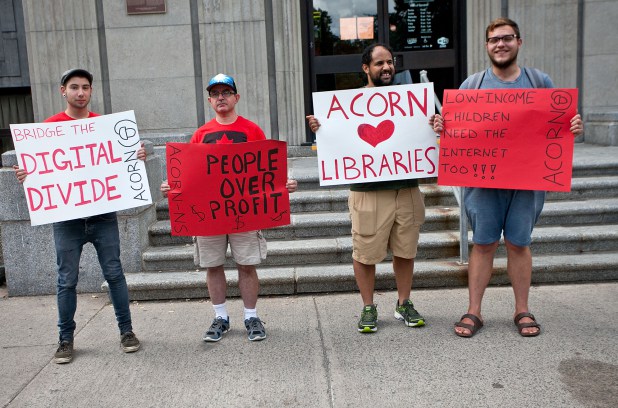
Darryl King is hoping internet companies will help level the playing field for low-income kids trying to get an education in today’s web-centric world.
On Thursday afternoon, King and other members of the local ACORN chapter (Association of Community Organizations for Reform Now) brought signs to the lawn of the Spring Garden Memorial Library in downtown Halifax to call attention to the “digital divide.”
King said families and individuals that fall below $30,000 a year often don’t have enough money to pay for high-speed internet and a computer they can use at home.
Related:
I just called to say, ‘use 10 digits:’ Starting Saturday, it’s 902 for all local calls
Parking ticket? No more pay-by-phone automated system as of July 1, HRM announces
Holy crap, Halifax: The scoop on spring cleanup in our city isn’t a very rosy one
“At libraries the ones that are there are booked and leaves them at a disadvantage,” King said. “They’re our next generation, we need them to succeed. How do they succeed if they don’t have the resources or the tools to make a difference?”
ACORN is calling on companies like Bell Aliant to offer a $10 per month web service and subsidized computers or tablets, and King is hoping they choose people over profit.
“What is more important, your bottom line or people who have the right to pursue an education … to contribute to society, eventually find employment through the computers, get off assistance and get back in the community?
King said they have contacted Bell so far, but have yet to hear anything back.
Prime Minister Stephen Harper has committed to getting high-speed internet in rural communities, but King said another priority should be helping low-income families in urban areas connect to the web.
“It’s not the same as it was 37 years ago, everything is … technology based,” King said. “It’s important to get out there and have that access like everybody else. The same playing field.”
-
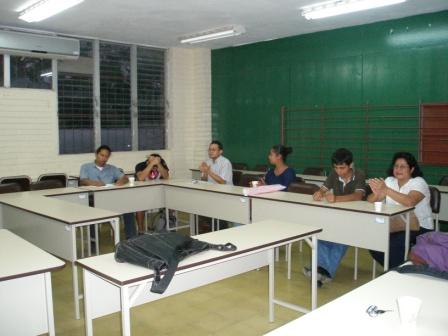
ACORN Scotland’s Leith Chapter
First meeting of ACORN Scotland’s Leith Community Organization starts with a bang. Good crowd assembles, does its business, breaks into small groups, and then after lots of discussion and democratic voting, makes the list to start taking names and kicking it up in Edinburgh!
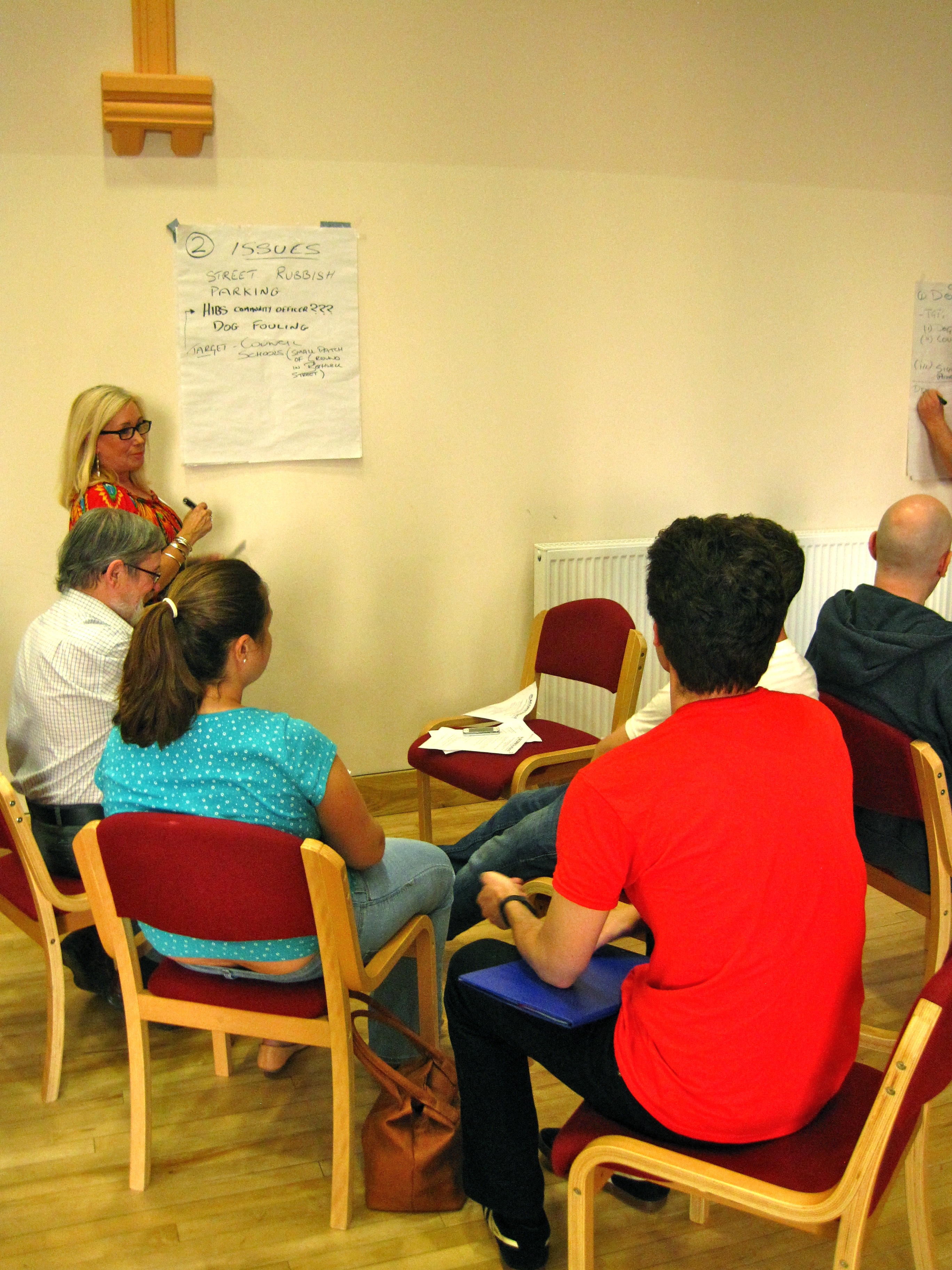
-
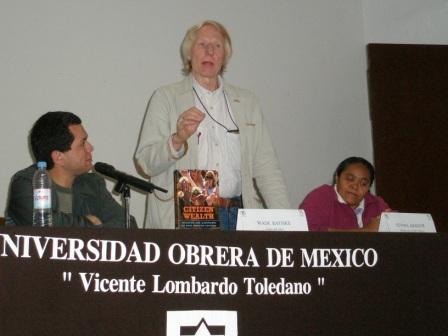
Honduras: Madres de deportados exigen trabajo y educación
http://www.latribuna.hn/2014/07/24/honduras-madres-de-deportados-exigen-trabajo-y-educacion/
24 julio, 2014 – 11:22 AM La Tribuna
Las madres de cientos de hondureños detenidos en Estados Unidos y México, protestaron en el Valle de Sula, al norte del país.
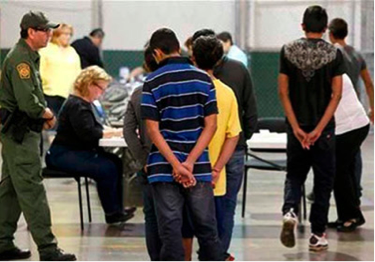
Madres de jóvenes y adolescentes migrantes detenidos el Estados Unidos protestaron al norte de Honduras.
Miranda Amador, representante del grupo de progenitoras, manifestó que la acción es para pedirle al gobierno de Honduras programas que impulsen la creación de trabajo, calidad de educación y reducción de la violencia.
“Estamos exigiendo que haya más trabajo, alternativas de organización para reducir la violencia y mejor educación”.
Al respecto, señaló que la petición es para todos los mandatarios involucrados en la migración, incluyendo al de Norteamérica, Barack Obama.
“Nos estamos manifestando para que haya solidaridad y apoyo con la niñez hondureña”.
La primera dama de la nación, Ana García de Hernández, anunció la realización de una maratón a favor de los retornados.
-
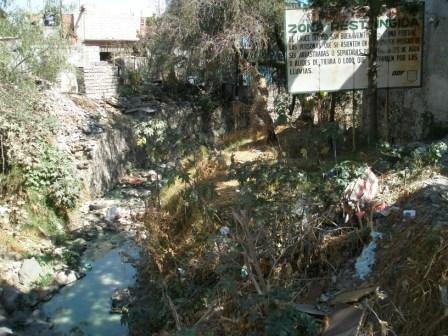
ACORN Scotland on the Move!
Members of ACORN Scotland went on education campaign to get the word out about ACORN Scotland. And they also just had their 3rd Organizing Committee meeting.
-
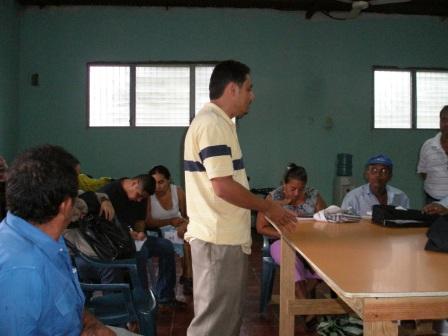
ACORN Members in Honduras Demonstrate for Protections
ACORN members demonstrated in Tegucigalpa at the US Embassy demanding that some of the funds being given to the Honduran military that have polarized the drug wars in their neighborhoods instead be devoted to providing protection in the communities themselves as well as creating opportunities to allow children and families to stay together in Honduras. Furthermore they demanded that border relief include resettlement relief and support for children and families being reunited.
ACORN members demonstrated in San Pedro Sula at the office of the Honduran First Lady on Thursday to demand that the President of Honduras get the message that lower income communities need protection and not platitudes if we are to keep our children safe from gangs, that rather than cut back on teachers and schools, we need educational and job support, and rather than all of the attention being given to the upper class and business interests, the barrios have to have resources.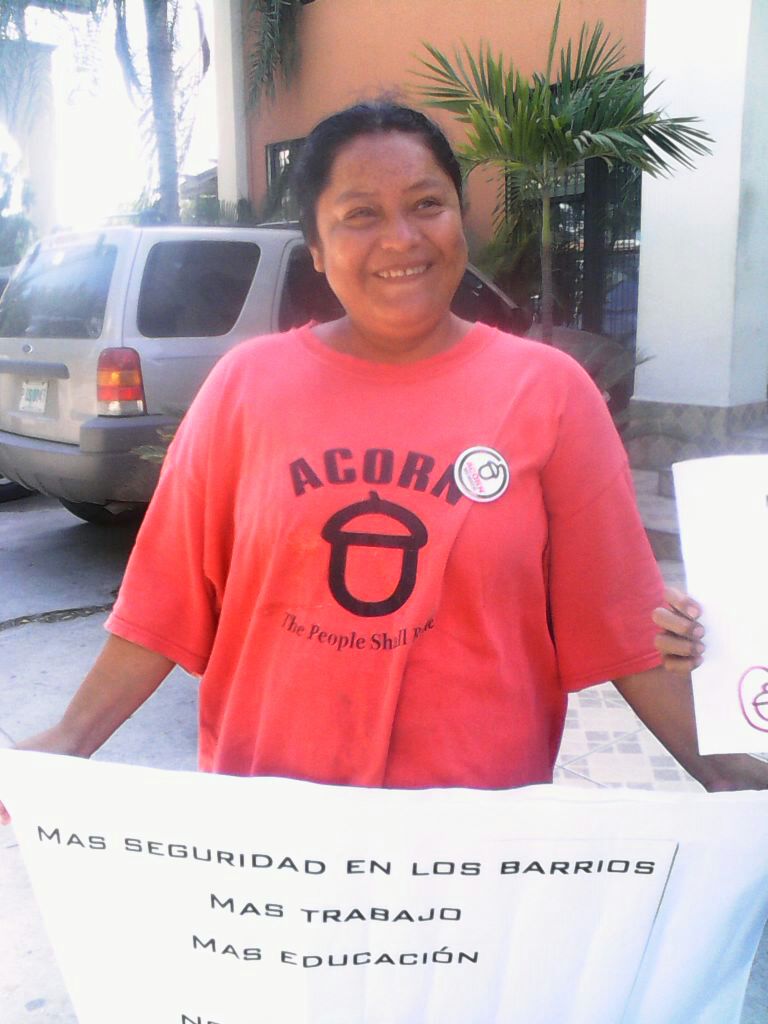
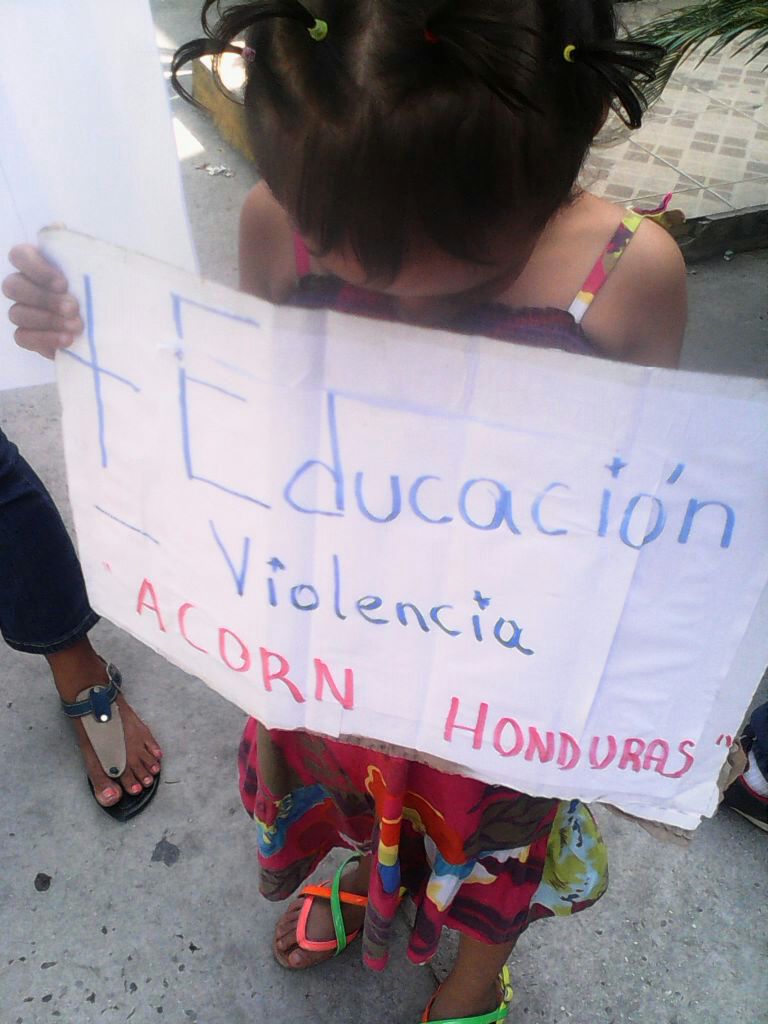
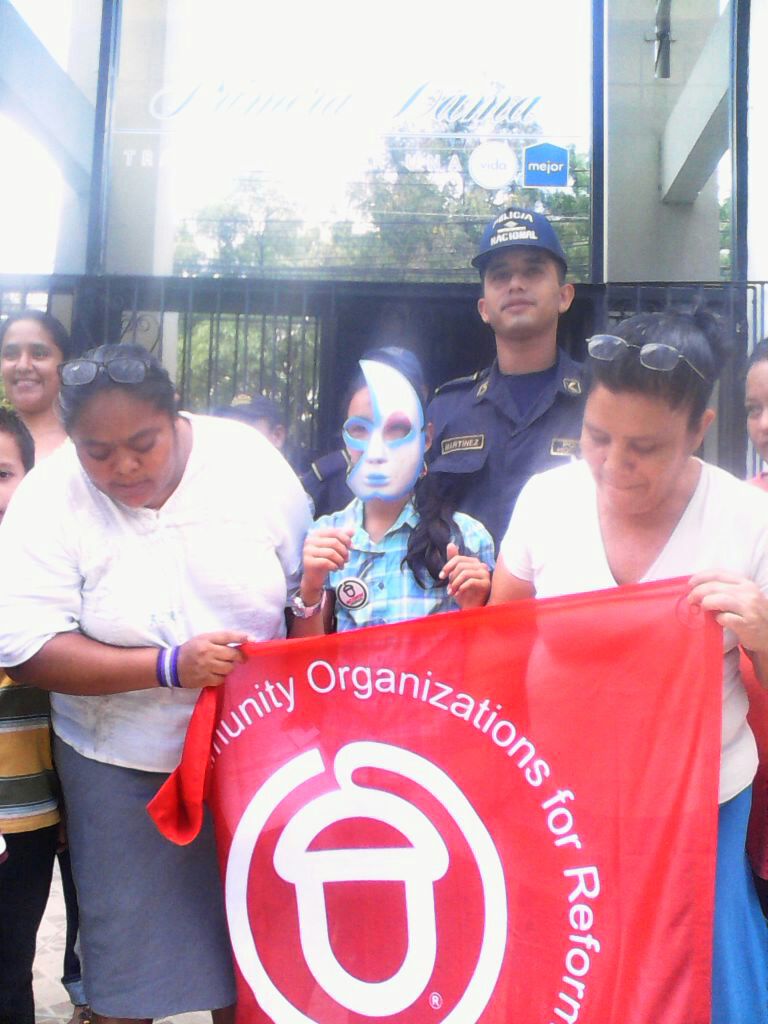
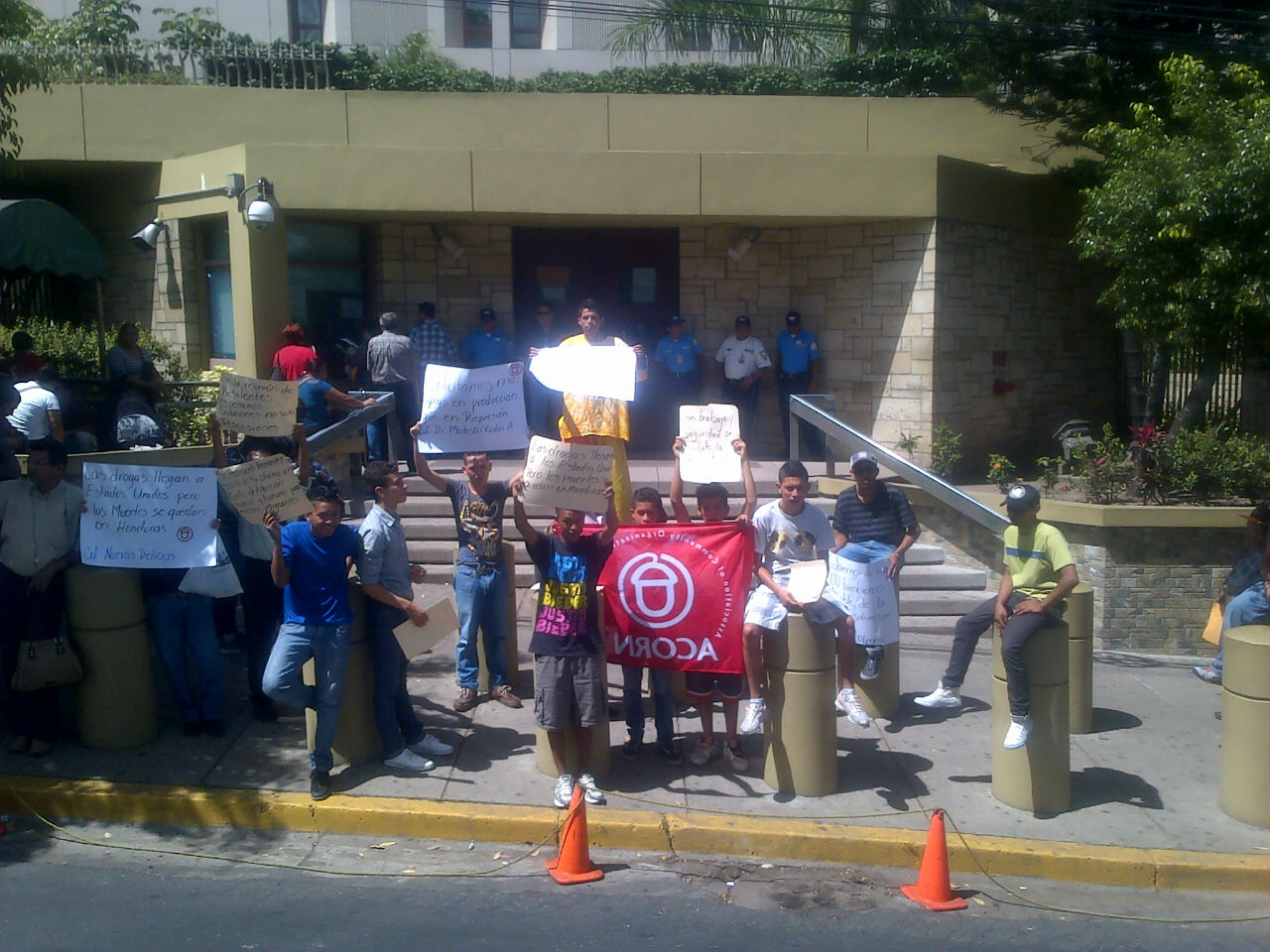
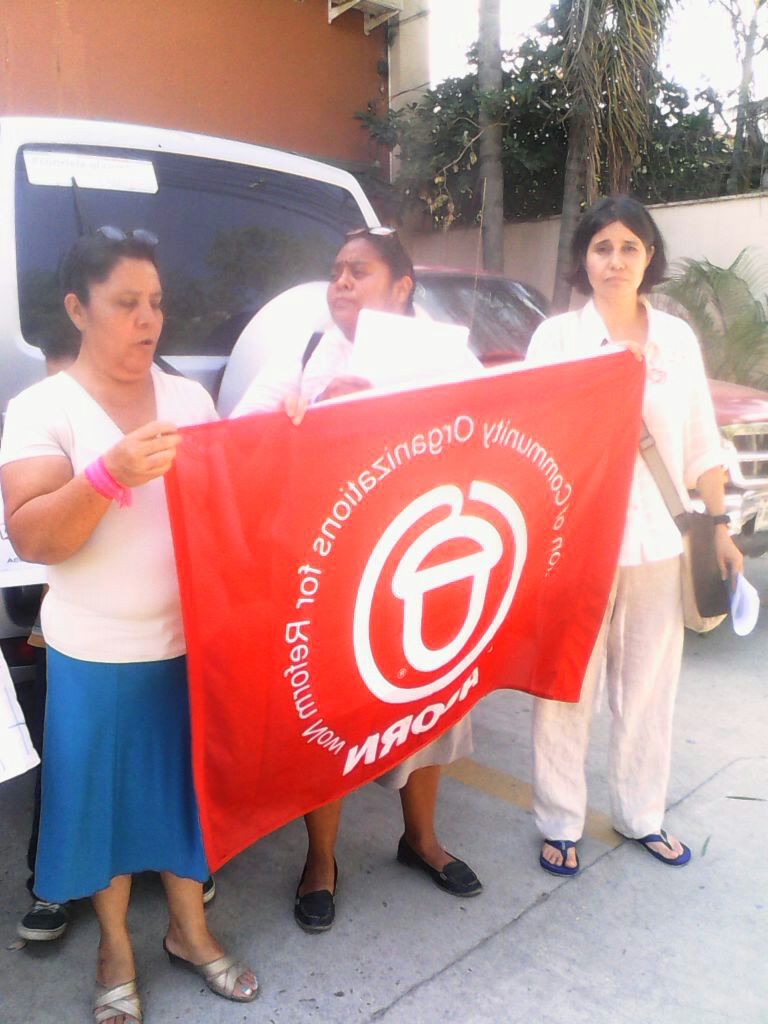
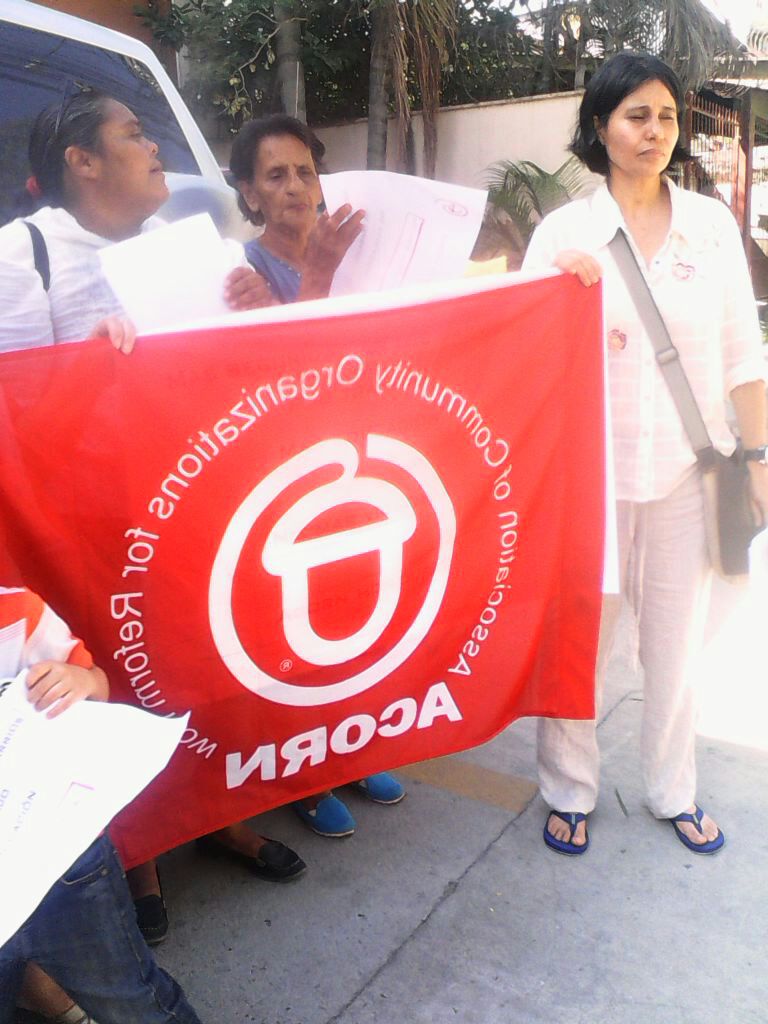
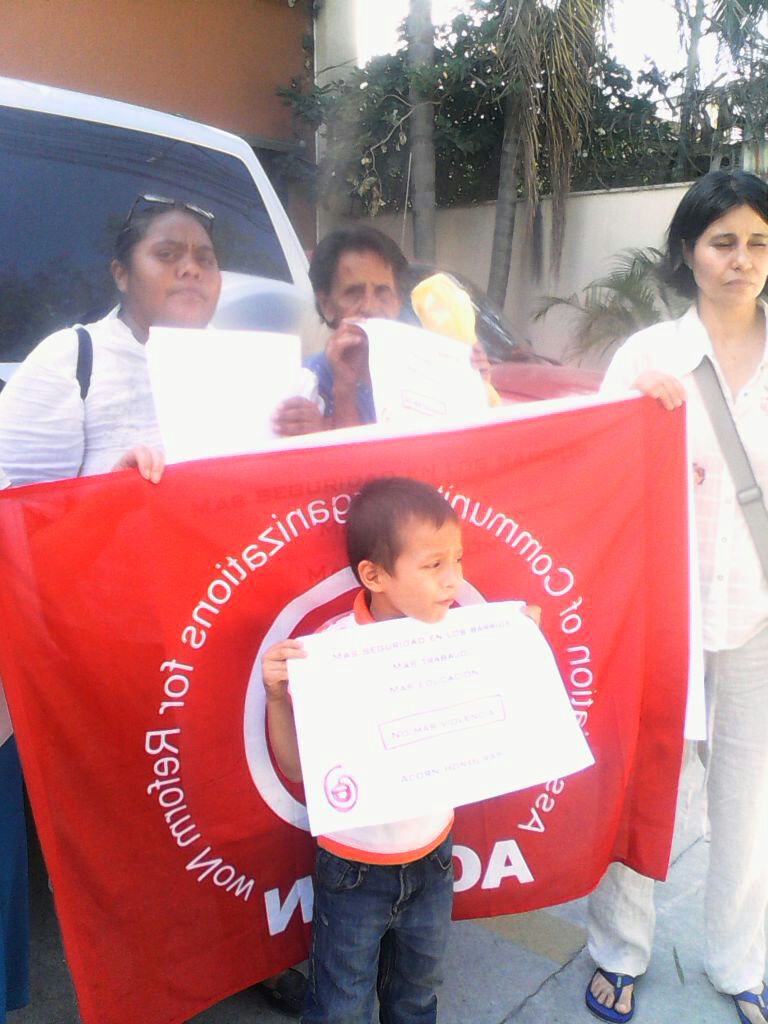
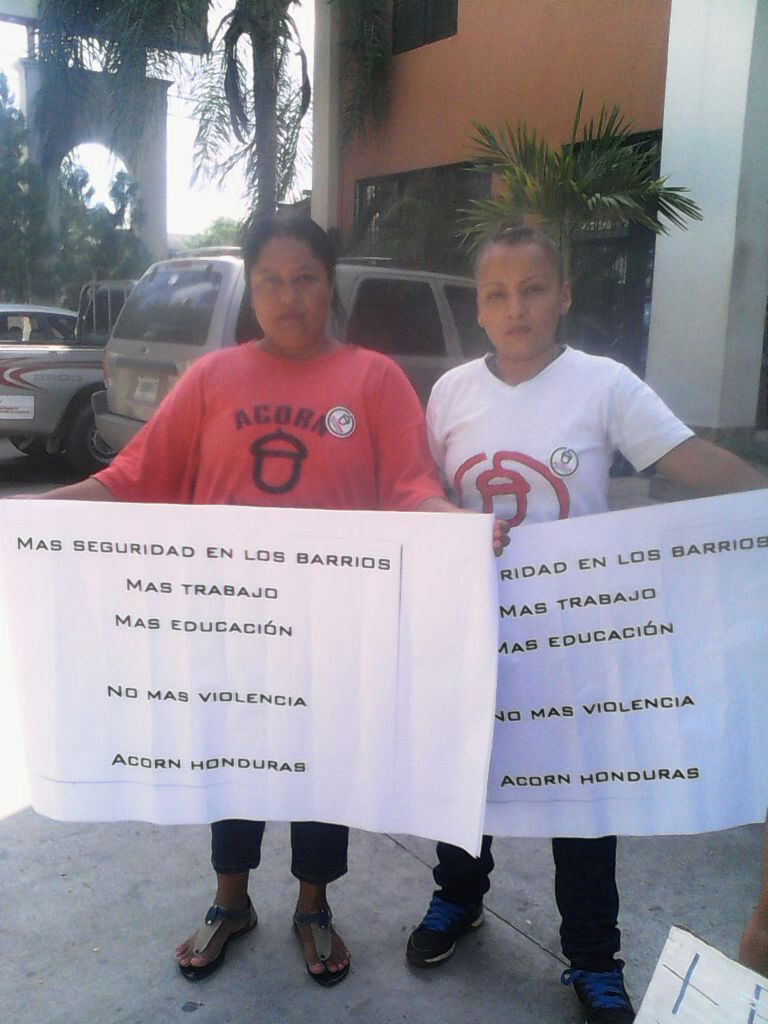
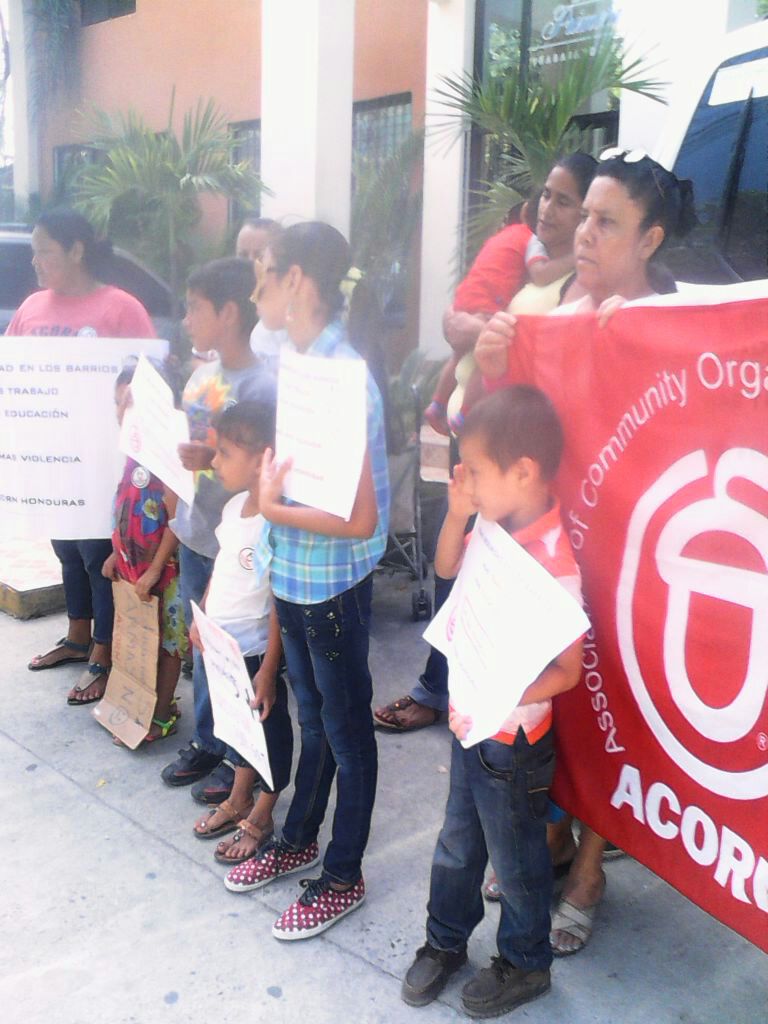
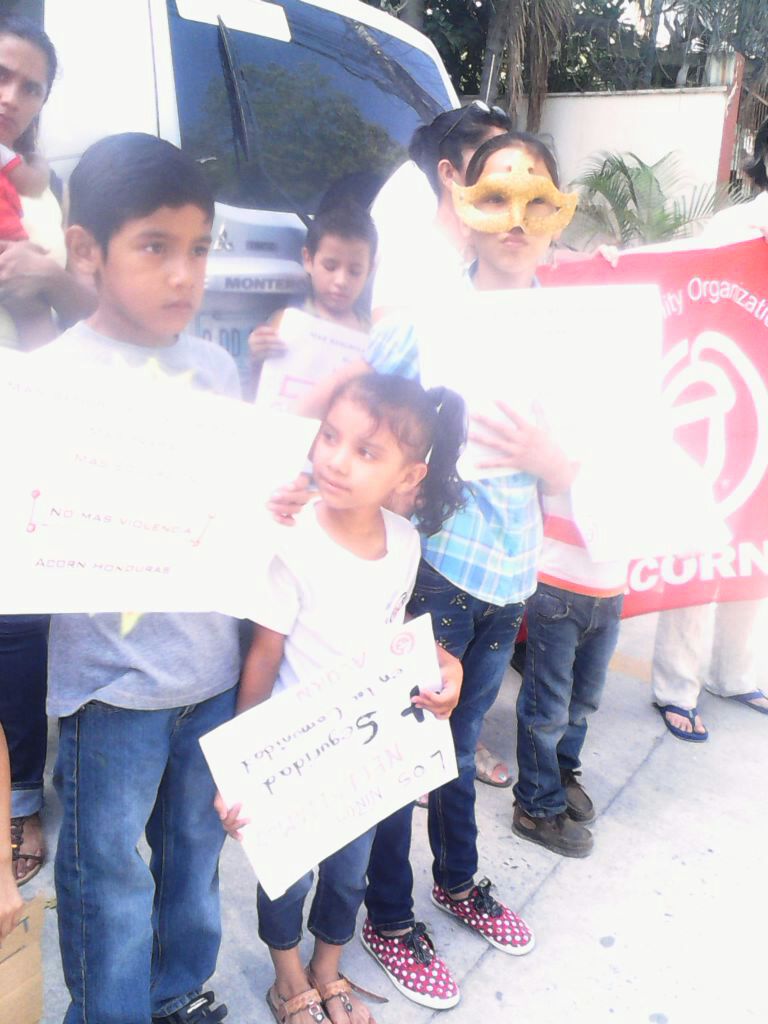
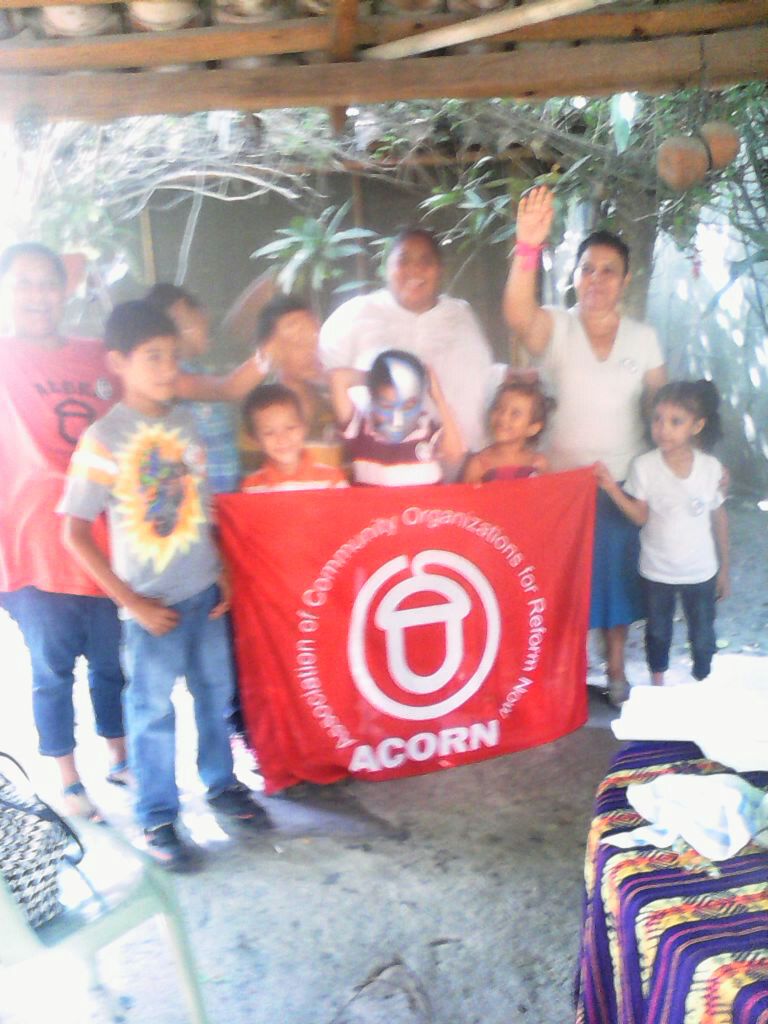
-
ACORN Honduras Members and Groups in Honduras Demonstrate for More Neighborhood Security, Jobs, and Services at US Embassy and Office of First Lady
For Immediate Release:
Contact:
Suyapa Amador
San Pedro Sula 98314578
Erlyn Perez
Tegucigalpa 88827712
Wade Rathke
New Orleans 504-628-8050
ACORN Honduras Members and Groups in Honduras Demonstrate for More Neighborhood Security, Jobs, and Services at US Embassy and Office of First Lady
Reacting to the crises of insecurity in San Pedro Sula and Tegucigalpa on the eve of the President of Honduras visit to the United States to meet with President Obama and other Central American presidents, ACORN members demanded that the government take immediate steps to provide effective and forceful security in lower income neighborhoods. ACORN groups led by several mothers who are ACORN members whose teenage sons were forced to flee the violence and other conditions in the barrios and are now being held in detention in Texas by immigration authorities were clear that their decisions to send their children to the United States was based on having seen no alternatives but to run from their communities, rather than towards something. They demanded that the government reduce the militarization in their communities provoked by this crises and actually provide security for residents from narco-traffickers and the threats of gangs.
ACORN member Luisa Almazan of San Pedro Sula spoke at the demonstration at the First Lady’s office on Thursday morning of her 14-year old son, Ermelindo Perez Almazan, having been forced to flee to the United Stated despite the risks when gang recruiters gave him a choice of joining the gang or being killed. ACORN members and mothers, Candida Hernandez of Villa Nueva Cortes in San Pedro Sula, and Maria Antonia Callejas of Barrio Cabanas, told of the dangers to their sons, 18 and 16 respectively, and the fact that to save their lives they had been forced to pay between $3000 and $5000 USD to help them flee to the United States from the violence and poverty. Now with no resources and deeply in debt in order to secure their children’s release they are being asked to raise more money to transmit documents and get representation.
ACORN members are demonstrating in Tegucigalpa at the US Embassy demanding that some of the funds being given to the Honduran military that have polarized the drug wars in their neighborhoods instead be devoted to providing protection in the communities themselves as well as creating opportunities to allow children and families to stay together in Honduras. Furthermore they demanded that border relief include resettlement relief and support for children and families being reunited.
ACORN members are demonstrating and staging a vigil in San Pedro Sula at the office of the Honduran First Lady on Thursday to demand that the President of Honduras get the message that lower income communities need protection and not platitudes if we are to keep our children safe from gangs, that rather than cut back on teachers and schools, we need educational and job support, and rather than all of the attention being given to the upper class and business interests, the barrios have to have resources.
ACORN Honduras pledged that they would keep standing up until there is change.
San Pedro Sula
When: 9:00 AM — Thursday, July 24, 2014
Where Despacho de la Primera Dama de Honduras en San Pedro Sula, Barrio Guadalupe, prolongacion Avenida Junior, 20 y 21 calle Frente a la ferreteria Direcom
Tegucigalpa
When: 9:00 AM – Thursday, July 24, 2014
Where: Embajada de Estados Unidos en Honduras Boulevard los Proceres.
Who: ACORN Honduras was founded four years ago as an affiliate and with the support of ACORN International (www.acorninternational.org), a global federation of 100,000 low and moderate income family members working in 17 countries including Canada, Italy, India, Kenya, Scotland, England, Argentina, Mexico, Peru, Ecuador, and the United States to build community and labor organizations to build power and win change for lower income workers and communities. ACORN is part of the community organizing tradition and continuous work since its founding in Little Rock, Arkansas in 1970.
***
Para publicación inmediata:
Contact:
Suyapa Amador
San Pedro Sula 98314578
Erlyn Perez
Tegucigalpa 88827712
Wade Rathke
New Orleans 504-628-8050
Miembros de ACORN Honduras y grupos en Honduras manifiestan en la embajada de EE.UU. y la oficina de la Primera Dama para demandar más seguridad en los barrio, más trabajos y más servicios
En reacción a la crisis de la inseguridad en San Pedro Sula y Tegucigalpa, y en vísperas de la visita del Presidente de Honduras a los Estados Unidos para reunirse con el presidente Obama y otros presidentes de centroamerica, los miembros de ACORN exigieron al gobierno que tome medidas inmediatas para proveer la seguridad eficaz en los barrios de bajos ingresos. Grupos de ACORN liderados por varias madres que son miembros de ACORN cuyos hijos adolescentes se vieron obligados a huir de la violencia y otras condiciones en los barrios y ahora están siendo detenidos en Texas por las autoridades de inmigración tenían claro que su decisión de enviar a sus hijos a los Estados Unidos se basaba en haber visto ninguna alternativa, sino para huir de sus comunidades, en lugar de hacia algo. Exigieron al gobierno que reduzca la militarización de sus comunidades provocados por esta crisis y, de hecho garantizar la seguridad de los residentes ante los narcotraficantes y las amenazas de las pandillas.
Luisa Almazán, miembro de ACORN de San Pedro Sula, habló en la manifestación en la oficina de la Primera Dama en la mañana del jueves acerca de su hijo de 14 años de edad, Ermelindo Pérez Almazán, después de haber sido obligado a huir a los Estados Unidos a pesar de los riesgos, caundo las pandillas le dieron la opción de unirse a la pandilla o ser matado. Cándida Hernández de Villa Nueva Cortés en San Pedro Sula, y María Antonia Callejas de Barrio Cabanas habló de los peligros a sus hijos, de 18 y 16, respectivamente, y el hecho de que para salvar sus vidas, se había visto obligada a pagar $ 3.000 a $ 5.000 USD para ayudar a sus hijos huir a los Estados Unidos ante la violencia y la pobreza. Ahora, sin recursos y profundamente en deuda con el fin de lograr la liberación de sus hijos que se les pide para recaudar más dinero para transmitir documentos y obtener representación en Texas.
Los miembros de ACORN están manifestando en Tegucigalpa en la embajada de EE.UU. exigiendo que algunos de los fondos que se presta a los militares hondureños que han profundizado las guerras de drogas en sus barrios se dedicará a proporcionar la protección en las propias comunidades, así como la creación de oportunidades para que los niños y familias a permanecer juntos en Honduras.
Además exigieron que el alivio de la frontera incluye alivio de reasentamiento y el apoyo a los niños y que las familias esten reunidas.
Los miembros de ACORN están manifetando y han puesto en escena una vigilia en San Pedro Sula en la oficina de la Primera Dama de Honduras el jueves para exigir que el Presidente de Honduras recibe el mensaje de que las comunidades de bajos ingresos necesitan protección y no lugares comunes, si queremos mantener a nuestros niños seguros de pandillas, que en vez de recortar en maestros y escuelas, necesitamos apoyo educativo y de empleo, y en lugar de toda la atención que se presta a la clase alta y los intereses comerciales, los barrios tienen que tener los recursos.
ACORN Honduras prometió que iban a mantener de pie hasta que haya un cambio.
San Pedro Sula
Cuando: 9:00 AM — Jueves Julio 24, 2014
Donde: Despacho de la Primera Dama de Honduras en San Pedro Sula, Barrio Guadalupe, prolongacion Avenida Junior, 20 y 21 calle Frente a la ferreteria Direcom
Tegucigalpa
Cuando: 9:00 AM – Jueves, Julio 24, 2014
Donde: Embajada de Estados Unidos en Honduras Boulevard los Proceres.
Quien: ACORN Honduras fue fundada hace cuatro años como afiliado y con el apoyo de ACORN International (www.acorninternational.org), una federación global de 100.000 miembros de bajos ingresos de familias que trabajan en 17 países, entre ellos Canadá, Italia, India, Kenia, Escocia , Inglaterra, Argentina, México, Perú, Ecuador y los Estados Unidos para construir organizaciones de trabajadores de la comunidad y para construir poder y ganar el cambio para los trabajadores y las comunidades de bajos ingresos. ACORN es parte de la tradición de la organización comunitaria y el trabajo continuo desde su fundación, en Little Rock, Arkansas en 1970.
